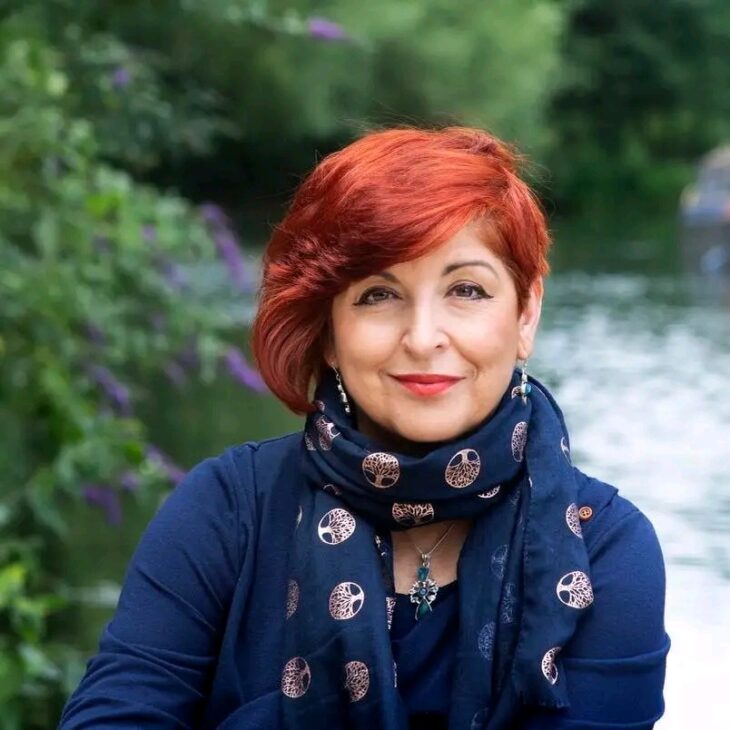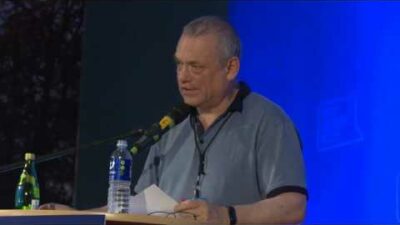
A man who has lost his home, who has lost everything, has loaded his remaining belongings onto a wheelbarrow and stubbornly walks through a city devastated by the Apocalypse. Where is he going? For what? They ask him, but he cannot answer. He only knows that he is no longer afraid of anything and there is nothing else left.
“They keep shooting, and I keep walking.”
It is Ukraine personified. There is nothing left for her either.
I remember March 2022. We went to see “Cyrano de Bergerac” and stayed in a tiny, our favourite London hotel The Rookery – 18th century, creaky stairs, stained oak and green walls: this was my birthday present, long ago organized by Brett…
In Mariupol, houses were burning, flames were escaping from apartment windows, from balconies, and some irrational part of the consciousness could not contain it, whispering: this cannot be, because it can never happen! This is probably some kind of diabolical computer generated imagery, and all the people were evacuated in advance. After all, if you hit a residential apartment building, people could die… They couldn’t intentionally hit people, could they?
People become very stupid when the brain is faced with the incomprehensible.
Our room in the hotel was in the attic, right under the roof. This part of London had once been heavily bombed in the PREVIOUS World War (that February it ceased to be the last), and suddenly – a clear razor sharp vision of a rocket pierced the fragile ceiling, lined with antique wood.
A completely realistic, close-up photograph appeared on the telegram channel: a dog eats the insides of a corpse, on which the remains of a Russian military uniform are visible. The gnawed rib bones of the “liberator”, the crazy eyes of a purebred, once clearly domestic dog… This was the first dead body I have seen so brutally close on screen, that it led to a state of panic attack – all the air was suddenly pumped out of the room!
…At The Rookery we were served dinner in the library: an oval table, starched napkins, crystal glasses, eyeless Caesar and Aristotle made of plaster. This dinner amidst “the plague” makes very uncomfortable now. Our thoughts and conversations were about how exactly this Creature would hit Europe with an atomic bomb, which even the waiters had little doubt about. There was no panic. Panic is when there is even slight an opportunity to escape from danger. Powerlessness is the color of the concrete that is the walls of Mariupol basements. The end of civilization has come to us. Our poor children: we’ve already seen everything…
The next day we returned from London, and the war was still going on. The first shocking news: a six-year-old girl died from dehydration in a Mariupol basement. I was very upset by the death of this nameless girl, whose name I still don’t know. I imagined her in a pink bobble hat against the backdrop of dirty lead concrete. I physically felt the powerlessness of the girl’s mother watching her die for several days in a dark concrete basement, like a crypt,under the roar and whistle of enemy shells outside — the daughter, whom she was preparing for her first day at school in September…
Their city was shelled by a merciless, vile enemy, and there was no water to be obtained. And it seemed to me that now, when they understand that people are dying, this nightmare will be stopped! I imagined the streets and squares of Russian cities filled to capacity with roaring outraged crowds demanding an end to the senseless bloodshed! I waited, and waited, and waited for these almighty crowds. In vain. There weren’t any.
We were allowed to skip the line in supermarkets: we recognized each other by the giant trolleys full of bottles of water, baby formula, medicines, diapers, blankets, and other things, etc…
We would leave everything at the collection points, which were usually organized by British Poles at big warehouses, and returned again, filling everything up more and more trolleys… My friend, a surgeon from a hospital in the south of England, organized the sending of huge lorries with medicines and equipment for operations, for the help to the wounded, and I was happy to help fill these lorries. The whole family transferred aid through the Red Cross. Then – there was volunteering. But there was a constant hope against hope that the Russians were about to come to their senses, and their army would stop killing…
In London, tourists, as always, walked around with plastic bottles: “Doctors recommend at least one and a half liters a day” – and these bottles suddenly took on a tragic meaning. The brain probably needs time to realize: the world has collapsed, it doesn’t matter whether you are inside or outside of this collapse.
The atmosphere was heavy with news, like that that blanket heavy of blood that covered the stretcher with a pregnant woman whose entire pelvis was torn apart by a shell fragment. She was still alive, on that stretcher, when she was filmed by Mstislav Chernov, a correspondent for the Associated Press, who brought to us the tragedy of Ukraine and the ruthlessness of its enemy. In the footage that I saw in 2022, a woman covered her huge belly with her hand, as if hopelessly protecting it, but when I saw her again in Chernov’s film “20 days in Mariupol”, I fully understood why: she was trying to feel, palpate, whether her baby was alive inside her. Before this film, for some reason I thought that woman has survived, but the story of the doctor of the hospital where the wounded were brought from the bombed maternity hospital destroyed my illusion. “She screamed “Kill me!”, realizing that her baby was dead inside, she died from massive loss of blood which was incompatible with life”.
The doctor said, the woman has died AFTER her unborn, even the last mercy to die before was denied to her… When she was carried on a stretcher, with her hips mutilated by an iron fragment, her legs were unnaturally twisted, and it reminded me of photographs of a girl killed in Israel thrown to the bottom of the track, whose legs were similarly twisted as scary as a broken doll’s. I’m not comparing anything other than this.
I will never again be able to look at the Russian tricolor without shuddering (if that country ever will repent for what they have done, the first thing that they should get rid of is this bloody tri-coloured rag that the world now associates with dead children). I can’t look at the Kremlin towers without shuddering, even innocent tourist shots of Moscow are not the same anymore, I can no longer keep fond memories of our trips there, everything that was connected with childhood, youth, good memory, friends, wonderful teachers have became tainted. I will have to (I don’t know how yet !) separate my good memories of the country where I was born from these horrors— may be with a thick waterproof partition, just as compartments in sinking ships are sealed, separating the flooded from the dry. And the letter Z was forever imprinted in the consciousness as “a black swastika in a white circle”, and never again, as long as I live, will it be otherwise.
During the last two years of war in Ukraine another terrible thing happened as well: war became the norm for everyone.
And that’s probably why, when I watched Chernov’s wonderful documentary “20 days in Mariupol”, which has already taken its place among the historical evidence of crimes against humanity, when I listened to a quiet, calm, muffled voice (this is how scouts talk on a combat mission so not to alert the enemy), I caught myself thinking that I’m watching these film with a subconscious, unconscious feeling of “preparation”: what to do, how to behave, what to do if WAR goes on and comes to us too.
After all, war, which has become the norm and evil, for which a plausible justification has been found, because it is easier for an indifferent conscience, always goes further. Always. It happened before and now it is described in every textbook of the Second World war: the hope that crocodile will be satisfied with just one victim and will not eat us, is hope in vain.
Indifference of conscience is an anesthetic ti facilitate the unstoppable march of teh war. It deprives hopeful people who yet live in peace of any will to act, of reason and of instinct of self-preservation, and it results in a tragic inaction of those people who could stop the bloodhsed and prevent their own demise which is only matter of time, but their imagination is unable to stretch that far. They think that their peace is forever.
That’s it, I can’t take it anymore, I’ll take a time out… “20 days in Mariupol” is an honest and terrifying movie. It is not only about Maripupol. It is about us as well. All world leaders, especially Trump, Orban and the Pope, Polish farmers, German (and any!) “Putinunderstenders” should watch it. And in The Hague it should be continuously broadcasted in the cells of war criminals, like in Burgess’s “Clockwork Orange”.
Finally, in the film by Mstislav Chernov, the Man Who Has Lost His Home, who has lost everything, walks and walks through an empty city, through a thick, smoky, real apocalypse. Where is he going? For what reason? The journalists ask him, but he cannot answer. He only knows that he is no longer afraid and there is nothing left of his former normal life.
“They keep shooting, and I keep walking”.
It is Ukraine personified.
And only Winston, who once saved the world, would not ask this Man where is he going: “If you realised that you are walking through hell, keep on walking”.




